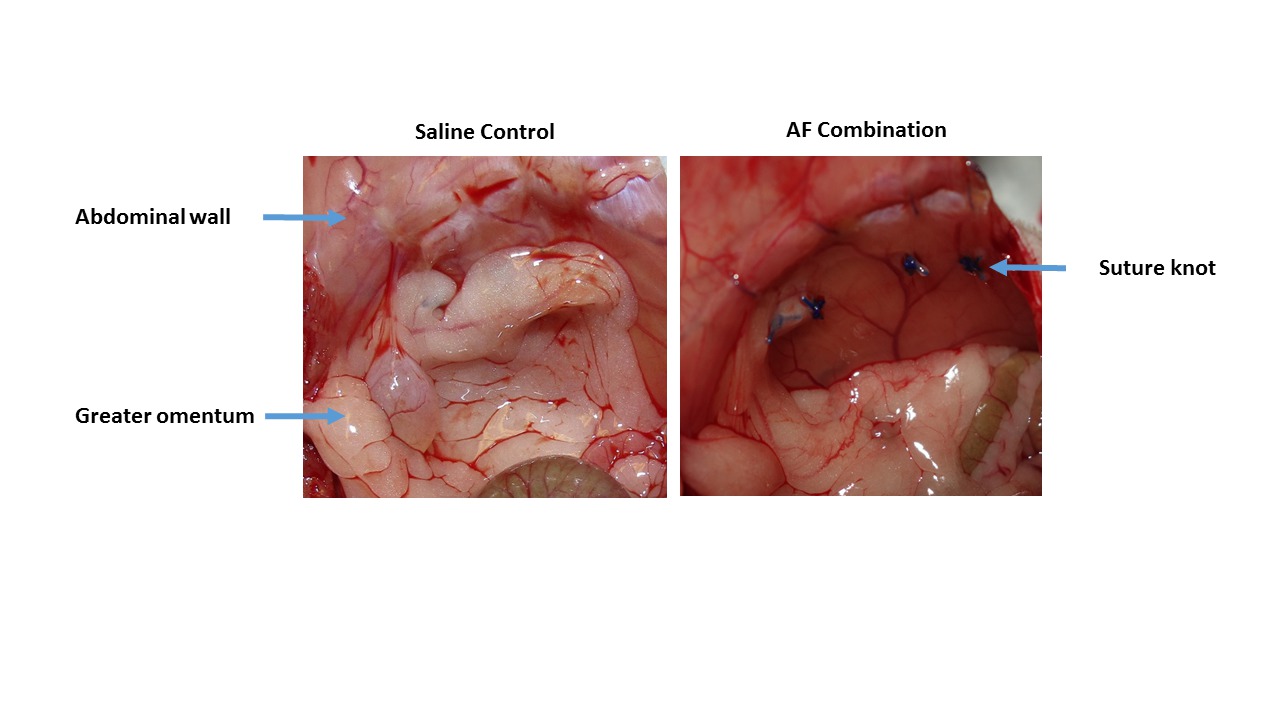|
Back to 2017 Posters
PHARMACOLOGICAL MOBILIZATION OF ENDOGENOUS STEM CELLS PREVENTS POSTSURGICAL INTRA-ABDOMINAL ADHESION IN RATS
Kenichi Iwasaki*1,2, Ali R. Ahmadi1, Le Qi1, Melissa Chen1, Akihiko Tsuchida2, George M. Williams1, Zhaoli Sun1
1Surgery, Johns Hopkins University School of Medicine, Baltimore, MD; 2Gastrointestinal and Pediatric Surgery, Tokyo Medical University, Tokyo, Japan
Background: Postsurgical adhesions are common and unavoidable sequelae estimated to occur in 90-95% of patients undergoing abdominal surgery. Up to 20% of these patients will experience symptoms ranging from pain to bowel obstruction. We have developed a stem cell mobilizing strategy that enables long-term liver and kidney allograft survival without sustained immunosuppression in small and large animals using a safe combination of two FDA approved drugs AMD3100 and low-dose FK506 (AF). Incidentally we have noted a subjective decrease in adhesion formation in animals with AF combination treatment. Therefore the purpose of this study was to investigate the effect of AF combination treatment on preventing postsurgical adhesion in a rat model.
Methods: Twenty-three adult Lewis rats (6 males, 17 females) were used in this experimental study. Abdominal adhesions were induced by creating four 1-0 prolene suture knots on the parietal peritoneum in a linear distribution. After the surgical procedure, the animals were randomly allocated into the AF treatment group (AMD3100 1mg/kg and FK506 0.1mg/kg, n=11), or control group (same volume of saline, n=12). AF was given subcutaneously after surgery and every other day for 10 days. On postoperative day 14, rats were euthanized and abdominal adhesion sites were photographed digitally. The severity of intra-abdominal adhesions were evaluated and scored blindly by five individual surgeons using a modified Zuhkle scoring criteria. Mean ± standard deviation (SD) adhesion scores were calculated for each animal to minimize inter-observer variability. Those scores were then used to calculate mean ± SD adhesion scores for the control and AF treatment groups.
Results: The surgical procedure resulted in a 100% occurrence of postsurgical intra-abdominal adhesions in control rats at 14 days post-operation. Adhesions were formed on 93.8% (45/48) of the suture knots in the control group, but reduced to 66.7% (30/45) in the AF treatment group (p= 0.008). Interestingly, the adhesion scores were significantly higher in saline control group (4.25 ± 0.52) than in the AF treated rats (2.60 ± 1.42), p= 0.002. Histological studies demonstrated less inflammation and tissue adhesion in rats treated with AF combination.
Conclusion: Pharmacological mobilization of endogenous stem cells using a combination of AMD3100 and low-dose FK506 significantly reduced intra-abdominal adhesions in a rat model of postsurgical adhesions. These findings suggest a novel therapeutic approach to preventing postsurgical adhesions in patients undergoing abdominal surgery.

Pictures of postsurgical intra-abdominal adhesions in each group, at 14 days post-operation.
Back to 2017 Posters
|


